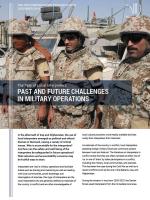Interpreters in military conflict
In the aftermath of the missions to Iraq and Afghanistan, the use of local interpreters emerged as political and ethical themes in Denmark. This raised a variety of critical issues such as the threats the interpreters faced during and after the conflicts as well as whether granting asylum to local interpreters would solve their security situation.
These questions particularly emerge because local interpreters are considered to be specifically in risk of being targeted or intimidated during conflicts and in the post-conflict phase.
This research paper discusses how the risk for local interpreters can be reduced in future operations. One argument is that The Danish Defence should initiate a context specific risk-analysis on the use of interpreters in the preparatory phase of each conflict to identify problem areas and reduce risks. A second finding is that questions of unresolved accountability towards the local interpreters continuously emerge if the risks they face are not adequately reduced or managed.
The research builds on a literature review and qualitative interviews conducted in the period from September - December 2014. The paper includes a number of recommendations for future operations.
During a conflict there should always be special consideration for local people, and there will always be a need for interpreters.
This calls for a less ad hoc and a more systematic approach. Denmark needs to have a model with regards to interpreters from the beginning, during and at the end of a conflict.
DIIS Experts



